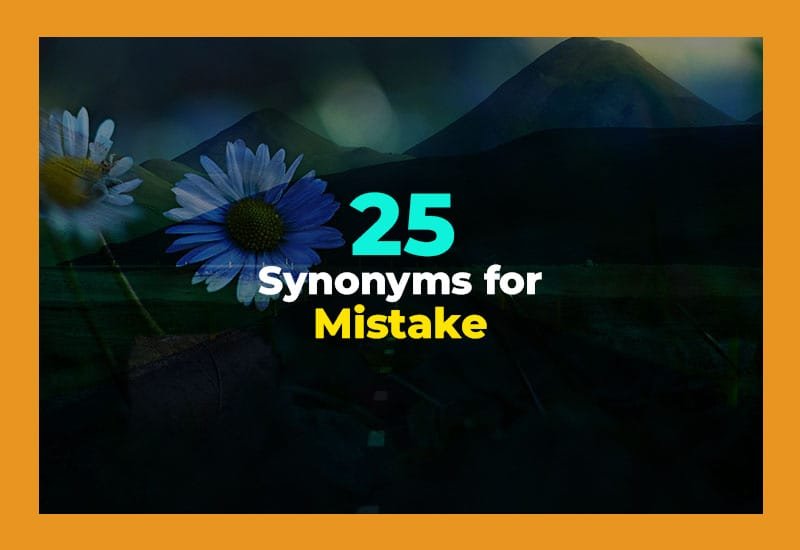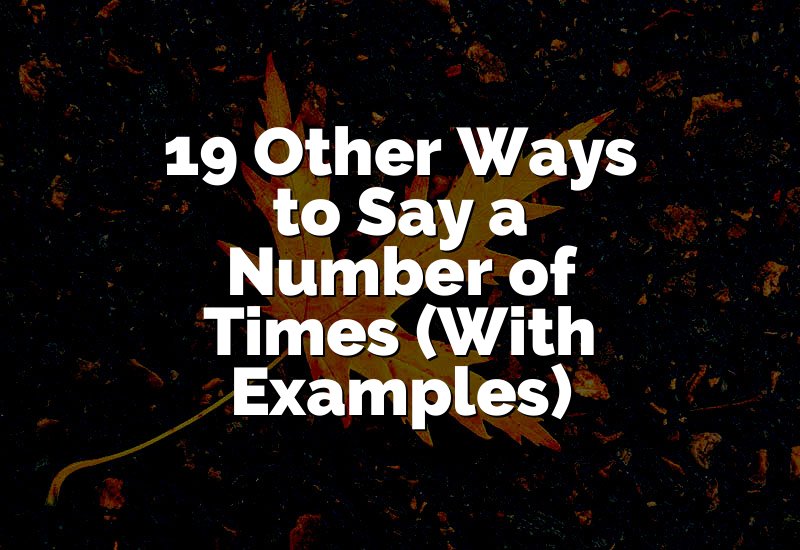Everyone makes them—slips, errors, and blunders can happen anytime. Finding the right word for mistake can make your writing or speech more interesting. Words like slip-up, blunder, or misstep show the same idea with a different flavor. In this article, we will explore 25 synonyms for mistake with examples to help you use them confidently.
| Synonym | Example |
|---|---|
| Blunder | He made a huge blunder by forgetting the meeting. |
| Slip-up | The accountant admitted to a minor slip-up in the report. |
| Error | There was a calculation error in the final results. |
| Misstep | Her misstep cost the team the championship. |
| Oversight | The missing signature was a simple oversight. |
| Faux pas | Forgetting her name was a social faux pas. |
| Goof | I made a silly goof during my presentation. |
| Flaw | There's a small flaw in the design that needs fixing. |
| Lapse | His lapse in judgment surprised everyone. |
| Misjudgment | The project failed due to a serious misjudgment. |
| Fault | The accident was entirely his fault. |
| Inaccuracy | The report contains some factual inaccuracies. |
| Slip | He had a slip while walking down the stairs. |
| Shortcoming | This plan has a few shortcomings we need to address. |
| Mistake | Everyone has made a mistake at some point. |
| Gaffe | The politician's gaffe went viral on social media. |
| Boo-boo | The toddler made a little boo-boo with paint. |
| Snafu | There was a snafu with the airline bookings. |
| Miscalculation | Their miscalculation led to extra expenses. |
| Fumble | He fumbled the ball in the last minute. |
| Blooper | That scene had a funny blooper in the movie. |
| Faultiness | The product was returned due to faultiness in the material. |
| Impropriety | The manager's impropriety caused a complaint. |
| Confusion | There was confusion about the meeting time. |
| Defect | The car was recalled due to a defect in the engine. |
25 Different Ways to Say MISTAKE: Another Word for MISTAKE
Blunder
Blunder is great when you want to describe a big, obvious mistake. It's often used in situations where the error is noticeable and sometimes embarrassing. A blunder shows poor judgment or a lapse in attention. It's suitable for both professional and casual contexts when something goes seriously wrong. People often use it when talking about errors that have noticeable consequences.
- He made a blunder by sending the email to the wrong client.
- Forgetting the password was a blunder he won't repeat.
- It was a blunder to ignore the warning signs.
Slip-up
Slip-up is perfect for smaller or unintentional mistakes. It has a lighter tone than blunder and is often used for casual errors. You can use it to describe mistakes in work, school, or personal life. Slip-ups are easy to fix and usually don't cause major problems. This word works well when you want to admit a mistake without sounding harsh.
- I had a slip-up and missed the deadline.
- She made a slip-up with the order details.
- There was a slip-up during the event setup.
Error
Error is a versatile word for any kind of mistake. It's widely used in academic, technical, and everyday contexts. Errors can be small or significant, depending on the situation. This word emphasizes the incorrectness of an action, decision, or calculation. It's straightforward and professional but can also be used in casual settings.
- The software flagged an error in the data.
- He corrected the error in his essay.
- A small error in the recipe ruined the dish.
Misstep
Misstep works well for actions that turn out wrong due to judgment issues. It's often used in social or professional situations. A misstep implies a mistake with consequences that could have been avoided. This word highlights the learning aspect of making mistakes. Using misstep can make your writing more precise and descriptive.
- Her misstep caused tension in the team.
- The politician's misstep led to criticism.
- Taking that approach was a misstep in negotiations.
Oversight
Oversight is ideal for mistakes that happen due to forgetting or missing details. It's often unintentional and can happen in work or personal projects. Using oversight signals that the error wasn't deliberate but still had an effect. This word adds a polite tone when pointing out mistakes.
- The missing signature was an oversight.
- There was an oversight in the project plan.
- His oversight caused a minor delay.
Faux pas
Faux pas is great for social mistakes or awkward moments. It often involves etiquette or behavior and can be embarrassing. Using faux pas adds sophistication to your description of a mistake. It's usually for situations that are noticeable by others.
- Forgetting her birthday was a faux pas.
- Wearing white to the wedding was a faux pas.
- He committed a faux pas at the dinner party.
Goof
Goof is a playful word for mistakes, usually minor or funny. It's casual and often used among friends or in informal situations. A goof suggests a mistake that isn't serious but noticeable. Using goof can lighten the mood when talking about errors.
- I made a goof with the invitation list.
- She goofed during the quiz.
- He goofed on his first try.
Flaw
Flaw is used when describing a mistake in design, plan, or idea. It points to imperfections rather than actions. Flaw works well for critical thinking, reviewing, or assessing projects. It's precise and gives a clear sense of what's wrong.
- The software has a flaw in the coding.
- There's a flaw in the argument.
- The painting had a small flaw.
Lapse
Lapse is great for temporary mistakes or short periods of forgetting. It implies that the error is unusual for the person. Lapse is often used in judgment, attention, or behavior contexts. It emphasizes that mistakes can happen to anyone occasionally.
- His lapse in focus caused the accident.
- She had a lapse in memory.
- A lapse in judgment led to a bad decision.
Misjudgment
Misjudgment highlights errors caused by wrong decisions or assumptions. It's ideal for situations where thinking or evaluating went wrong. Misjudgment emphasizes the reasoning behind a mistake, not just the action. It's useful in professional, personal, or analytical contexts.
- The investment failed due to misjudgment.
- He realized his misjudgment too late.
- Her misjudgment affected the whole project.
Fault
Fault is commonly used to indicate responsibility for a mistake. It's direct and often legal, technical, or everyday usage. Fault emphasizes accountability and who is to blame. It can be formal or informal depending on context.
- The accident was his fault.
- Everyone shared the fault in the misunderstanding.
- She admitted her fault openly.
Inaccuracy
Inaccuracy refers to errors in facts, data, or information. It's ideal for academic, technical, or professional writing. This word emphasizes the incorrectness rather than the action. Using inaccuracy shows precision in identifying mistakes.
- The report had multiple inaccuracies.
- There was an inaccuracy in the map.
- He corrected the inaccuracy in the article.
Slip
Slip is a casual term for minor mistakes, often physical or verbal. It can be accidental and easy to recover from. Using slip works well when describing small blunders or accidents.
- He had a slip while walking down the stairs.
- I made a slip in spelling her name.
- The actor had a slip during the scene.
Shortcoming
Shortcoming is used for limitations or weaknesses that cause mistakes or failures. It's often applied in planning, performance, or skill assessments. Shortcoming highlights areas for improvement.
- The plan has a few shortcomings.
- Her report showed shortcomings in research.
- Budgeting revealed a shortcoming in the project.
Mistake
Mistake is the most general term for an error. It's widely understood and applicable in any context. Using mistake is straightforward and effective when no other word fits. It's versatile and easy to communicate.
- Everyone has made a mistake.
- That was a costly mistake.
- He learned from his mistake.
Gaffe
Gaffe refers to social or public mistakes, often embarrassing. It's commonly used in media or public speaking contexts. Gaffe highlights errors that draw attention from others.
- The speaker made a gaffe on live TV.
- Forgetting the title was a gaffe.
- His gaffe became a viral moment.
Boo-boo
Boo-boo is playful and childish, often for minor accidents or silly mistakes. It's lighthearted and non-threatening. Using boo-boo can make situations seem less serious.
- The toddler made a little boo-boo with paint.
- I made a boo-boo in the kitchen.
- He had a boo-boo on his homework.
Snafu
Snafu describes chaotic mistakes, often in processes or plans. It's informal and emphasizes confusion caused by errors. Using snafu works when things went unexpectedly wrong.
- There was a snafu with the airline bookings.
- The meeting turned into a snafu.
- Shipping became a total snafu.
Miscalculation
Miscalculation refers to wrong calculations or judgments, often resulting in problems. It's suitable for finance, planning, or strategy contexts. Miscalculation highlights the reason behind errors.
- Their miscalculation led to extra expenses.
- He realized his miscalculation too late.
- Miscalculation caused delays in construction.
Fumble
Fumble is perfect for clumsy or awkward mistakes, often physical or in tasks. It emphasizes the struggle in making the error. Fumble can be playful or serious depending on context.
- He fumbled the ball in the last minute.
- She fumbled her words during the speech.
- I fumbled with the keys in the dark.
Blooper
Blooper is often used for funny mistakes, especially in performances or recordings. It's casual and entertaining. Using blooper works for storytelling or media.
- That scene had a funny blooper.
- The actor's blooper made everyone laugh.
- A blooper occurred during filming.
Faultiness
Faultiness points to inherent problems in objects, plans, or systems. It's formal and precise. Using faultiness shows that errors come from design or material flaws.
- The product was returned due to faultiness.
- Faultiness in the engine caused recalls.
- We noticed faultiness in the software.
Impropriety
Impropriety indicates mistakes in ethics, conduct, or professionalism. It's formal and serious. Using impropriety emphasizes inappropriate actions rather than accidents.
- The manager's impropriety caused complaints.
- Impropriety in the report was investigated.
- He apologized for the impropriety.
Confusion
Confusion can result from misunderstanding or mistakes. It often happens with instructions, plans, or communication. Using confusion highlights uncertainty caused by errors.
- There was confusion about the meeting time.
- The instructions caused confusion among staff.
- Confusion led to double bookings.
Defect
Defect is used for mistakes in products or manufacturing. It emphasizes the imperfection in items. Using defect is precise for technical or commercial contexts.
- The car was recalled due to a defect.
- Defect in the gadget caused malfunctions.
- They fixed the defect before launch.

Final Thoughts
Mistakes happen to everyone, and knowing different words for them helps communicate better. Choosing the right synonym can add clarity, humor, or precision. Use these 25 words to describe errors in unique ways. Each one fits different situations and adds variety to your writing or speech.









